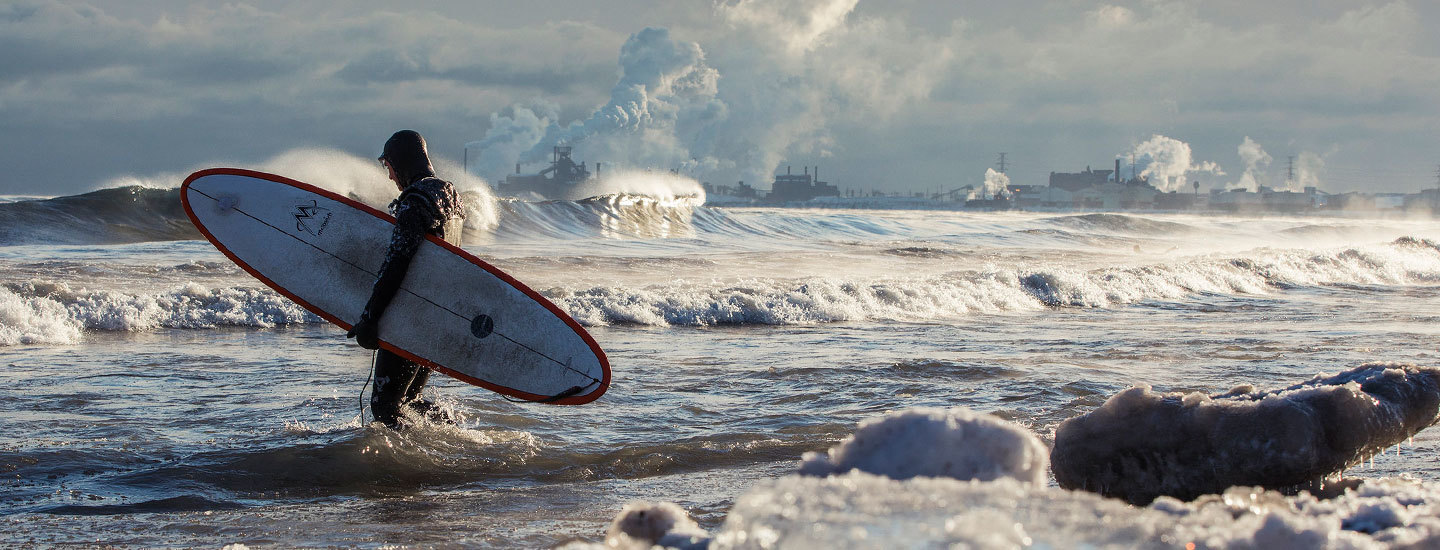
The Surfrider Foundation, including our Chicago Chapter, is celebrating the achievements of our campaign and lawsuit to hold U. S. Steel accountable for polluting Lake Michigan. More than four years ago, in January 2018, Surfrider filed our lawsuit against the company for its discharge of nearly 300 pounds of toxic hexavalent chromium into Lake Michigan and other clean water violations adjacent to the Indiana Dunes National Park and close to a popular surfing location. On September 23, the court dismissed our ongoing lawsuit. While Surfrider Foundation is disappointed and disagrees with the court’s most recent ruling, particularly in light of U.S. Steel’s continued permit violations after it fully implemented the governments’ consent decree, the dismissal comes only after our lawsuit prompted state and federal regulators to file a second lawsuit, in which Surfrider and the City of Chicago joined as intervenors to protect our interests in clean water. The Court ultimately approved a settlement between environmental regulators and U. S. Steel, but it did so only after the regulators and U. S. Steel had improved the initial proposed settlement along the lines of input from Surfrider and the City. We achieved improvements in the form of a new water quality monitoring project and improved public notification requirements in order to better inform the public of health concerns in the event of water pollution.
In November 2017, Surfrider Foundation sent a notice of intent to sue U. S. Steel for Clean Water Act violations at its Portage, Indiana plant. The notice stated that the company had repeatedly violated permit limits related to toxic discharges, such as for chromium, had discolored nearby waters by these discharges, and had failed to implement necessary operations and maintenance practices to prevent these and other kinds of illegal discharges. In January 2018, Surfrider filed its lawsuit against U. S. Steel for these violations in the U.S. District Court for the Northern District of Indiana. In March 2018, U. S. Steel answered Surfrider’s complaint and admitted to fifty-four of the violations. In April 2018, the United States and the State of Indiana filed their own complaint against U. S. Steel, including a proposed settlement agreement, called a consent decree
In July 2018, Surfrider Foundation filed extensive comments opposing the proposed consent decree, citing its inadequate penalty and lack of a local environmentally beneficial project. Local environmental projects are imperative as they benefit the areas and communities negatively impacted by pollution. Surfrider made similar arguments as an intervenor in briefs filed with the court. As a party to the government’s case, Surfrider filed multiple briefs, expert statements, and hundreds of pages of exhibits with the court in support of those arguments. Surfrider also engaged with roughly a dozen member surfers to tell some of their stories to the court about how U.S. Steel's pollution has negatively impacted them.
While the modified, approved consent decree still has shortcomings, Surfrider’s citizen suit started the process leading up to the governments’ lawsuit, and Surfrider’s involvement as an intervenor in that suit, along with the City of Chicago, resulted in meaningful improvements. U.S. Steel ultimately agreed to implement a local environmentally beneficial water quality monitoring project for the community negatively impacted by its pollution for three years, which includes several shore locations along Lake Michigan, including near the Midwest Plant and Indiana National Dunes Park, which is affected by U.S. Steel’s water quality violations. Specifically, the project requires testing at seven locations, on a monthly basis between October 1 and April 30, and a weekly or twice-weekly basis for particular locations between May 1 and September 30. U.S. Steel is required to use a certified third party for all sampling and reporting. Public sampling reports must be made publicly available at www.midwest.uss.com, and U.S. Steel is required to input all results for E. coli into the Beach Guard notification system at https://www.in.gov/idem/lakemichigan/pages/beachguard/. U.S. Steel is also required to provide EPA and IDEM with the raw lab data for chromium, hexavalent chromium, and E. coli within eight hours of obtaining a test result from the lab.
U.S. Steel also ultimately agreed to improved public notification requirements in the event of a future spill or release to ground, soil or water, in addition to other applicable legal notification requirements. Roughly 15 parties are specified in the notification list, with up-to-date contact information, including the National Response Center, Town of Ogden Dunes, Porter County Local Emergency Planning Committee and Porter County Sherriff’s Office, the Indiana Dunes National Park, the City of Portage, and the City of Chicago Department of Water Management, among others.
Surfrider’s participation and the media coverage the campaign generated further marshaled tremendous community support for the important issues related to protecting a clean Lake Michigan.
Finally, Surfrider was also heartened by the separate 2021 enforcement action by the Indiana Department of Environmental Management for U.S. Steel permit violations. An “Agreed Order” for U.S. Steel’s polluting discharges that occurred between November 2018 and November 2019 included a significantly higher penalty than that included by the consent decree—much higher than IDEM orders typically seem to include when public watchdogs like Surfrider are not at work.
While Surfrider steadfastly called for additional relief and improvements to U. S. Steel’s operations and maintenance practices that were not mandated, we nevertheless recognize and celebrate the significant gains that Surfrider’s campaign achieved. In the order dismissing Surfrider’s case, the judge found that the case between the United States and the State of Indiana and U. S. Steel had addressed Surfrider’s claims, which were raised for the first time before the court in Surfrider's case.
Surfrider will continue to diligently monitor water quality and hold polluters accountable in order to protect our important recreational resources and those who enjoy them.
The Surfrider Foundation is grateful to be represented by the Abrams Environmental Law Clinic at the University of Chicago Law School in this litigation.
